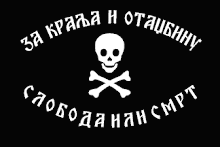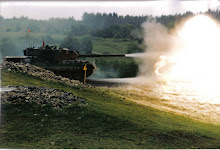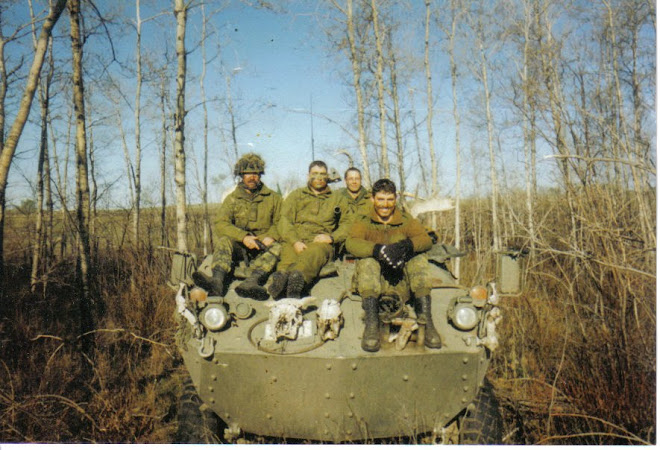"La Vanguardia" , Spain - July 11, 2010
"Aniversario balc? Nico"
Translated from Spanish to Russian and then into English;
Does not help the tens of thousands killed in the war in Yugoslavia, but there are few among the more disgusting things to a journalist than a falsification, and a dual approach in the information business, when it comes to horrific crimes. The procedure for the old and famous: ignore one another and emphasize the massacre. Thus, the massacre in Srebrenica was, and still remembered by, as "the worst massacre in Europe since the Second World War." In reality - a scam, through humanitarian war to which Euro Atlantis pointed to a new continental order.
Legend has it that Srebrenica was a peaceful, demilitarized town under UN control, in which Serbs massacred 8,000 men, when captured the city in July 1995. There is no doubt that in July 1995, there were many deaths in the area of Srebrenica. The bulk of them occurred when a large military contingent of Bosnian Muslims, armed civilians and their families fled the city and were mercilessly attacked by a deadly ambush by Bosnian Serb forces, who also used the penalty.
It cited as examples of "Serbian genocide" for the sole reason that the West's interest to emphasize the guilt of the Serbs, the West's enemies in the Balkan wars. For the same reason, two other mass killings, in which Serbs were as victims, both before and after the events in Srebrenica did not recognize and celebrate today as "the worst massacre in Europe since the Second World War."
Ignore a massacre, to notice another
Between 1992 and 1995, before the so-called "Srebrenica", dozens of Serb villages in Srebrenica - Bratunac were destroyed by Bosnian Muslim fighters. In the region of 3,300 Serbs were killed between 1992 and 1995, of which only 880 were soldiers, the rest civilians, according to research conducted Milivoem Ivanisevic. Another author, Alexander Dorin, mentions in his book (History Srebrenitsa. socially acceptable racism, 2010) 41 villages and 1,300 Serbs were killed during the period from April 1992 to April 1993 in the Srebrenica area. Zoran Stankovic, the Serbian coroner and his team found more than a thousand corpses of Serbs in the same area until July 1995.
Throughout that era, "demilitarized" city is a base for insurgency operations Muslim Naser Oric, whose groups and realized the job: the mass killings of Serbs in the vicinity of the city and settling of accounts within it, as explained numerous sources, including the mayor of Muslim Ibrahim Mustafic in the popular book "Plan of chaos", a publication which has made him the object of an assassination attempt in 2008. French General Philippe Morillon, the chief of UN forces in Bosnia in 1992-1993, Naser Oric called "war criminal who did not take prisoners." His colleague, Canadian General Lewis MacKenzie, the head of the UN force, said: "Everything indicates that Naser Oric had killed as many Serbs around Srebrenica, the Bosnian Serbs have been killed after". The media prefer not to talk too much about these facts.
Also unnoticed massacre of Serbs, immediately after the events in Srebrenica, a so-called "Operation Storm" against Croat Krajina in August 1995 that led to the exodus of 200,000 Serb refugees and the death of more than 10,000 Serbian civilians.
The legal arm Pentagon
In the case of Srebrenica Tribunal for the Former Yugoslavia was never interested in the testimony Stankovic, Ibra Muslim Mustafic, Canadian Mackenzie, as well as in any information that goes beyond a prepared script of events - a phenomenon that is considered a Bulgarian journalist living in the Netherlands, Germinal Sivikovym (Germinal Civikov) in his book "Srebrenica. The main witness »(Srebrenica. Der Kronzeuge), 2009. In general, this tribunal fattened Serbian facts because he was not created by an instrument of justice and the judicial arm of NATO to justify their goals, one of which was, according to Edward S. Herman, "to focus, to demonize, isolate and condemn the Serbs who been the target of NATO. "
Juergen Elseser (Kriegslügen, Der Nato-Angriff auf Jugoslawien, 2008), Alexander Dorin, Edward S. Herman and others emphasize that the leaders of the Bosnian Muslims have already cried "genocide!" before the Serbs captured the town. It was necessary to shake up public opinion to the horrors of the Yugoslav wars with clearly linked to the past and with a menu of Western interests is very simply and effectively pointed to the "genocide" and "ethnic cleansing" at the hands of the Serbs. Excitement around the events in Srebrenica was used for this purpose.
The same thing happened in the explosion on the Sarajevo market on Aug. 28, 1995 on the eve of the NATO summit, an event which decided the issue of bombing the Serbs. It is unclear who was the author of the explosion, the Serbs there, as asserted by the media, whether Muslims, which pointed to many Western observers and NATO security forces, as alleged by Moscow's Russian military intelligence sources, but after that, "genocide" and the slaughter of even the German Greens that ought to be sent the German army in Yugoslavia, to "prevent a new Auschwitz" ...
Manipulation was repeated in the Kosovar campaign. Serbia, which, even in the disbanded Yugoslavia was the most multi-ethnic part of the former federation, had as a program of "ethnic cleansing", said then. Milosevic's famous speech at Kosovo Field, June 28, 1989 again and again presented as an example of Serbian exclusive legions of unqualified journalists who do not even bother to read it (see: http://www.hirhome.com/yugo/bbc_milosevic.htm). It was in Kosovo, where the European media have demonstrated the ability to follow the martial music that many previously considered the prerogative of the United States.
"Within 79 days of NATO bombing of Yugoslavia, I can not remember more than 5 or 6 questions of journalists, who even remotely doubted would be in the rubbish, thrown into the box Jamie Shea (NATO Spokesman), George Robertson, and, moreover, Javier Solana," - wrote the ill-fated Edward Said (Al-Ahram Weekly, 24-30 June 1999). Said about 500,000 dead Albanians. In total, counted about 5-7 thousand dead and missing on both sides, including victims of NATO bombing, and no organization and no media has not apologized. In summer 1999, several weeks of occupation of Kosovo by NATO forces, 230,000 Serbs, Montenegrins, Roma and Albanians - "collaborators" were expelled from Kosovo, while in the region, there were 46,000 NATO soldiers, that is, one soldier for every four exiles .
Unemployed NATO
In Europe in the early nineties there were two "strategic" problem: what to do with the territories, remaining after the withdrawal of the Soviet Union and the continent, and what to do with NATO, the instrument under the authority of Europe, the United States in the security field. Disappeared "communism", and for NATO's existence did not have any excuses. Violence in the Balkans was the ideal solution.
After reunification in 1990, and the disappearance of the Soviet Union, Germany has decided that its interests in Europe to separation of Slovenia and Croatia. The last time Berlin directed at those edges of its army, the Nazis were supported by Bosnian Muslims and Croats - Catholics who have killed a million Serbs in the Balkan Holocaust. It was clear that under any scenario, the breakup of Yugoslavia would be crazy to ask for the Serb minority in Croatia and Bosnia, that they lost their memory, and agreed with the board their former oppressors - pro-Nazi Croats and Muslims, but Germany, the United States and Britain have counted on it .
The European Union should continue to link with the United States, said at the time Washington strategist Zbigniew Brzezinski, pulling back as far as possible, "the inevitable economic and technological competition with the United States, which is able to form a" geopolitical interests in the Middle East and other regions of the world that could differ significantly from the (interests - prim.perev.) United States. "
"U.S. involvement in NATO peacekeeping in the former Yugoslavia (" the only European region, in which there is no guarantee either peace or stability "), you need to keep the leadership in Washington in the Atlantic Union," - explained Ivo H. Daalder, coordinator of policy with regard to Bosnia and a member of the National Security Council in the first Clinton administration.
Ex-socialist countries of Eastern Europe were invited to join NATO as a sort of waiting room for membership in the European Union. In addition, Russia, with spectacles on his political regime, "defending democracy", with a tank firing at the Parliament, fascinating privatization and the Chechen war, worked hard to give these countries more than enough arguments for seeking asylum. Adding it to the bitter experience of half a century of Soviet domination, these images are aggravated by the fear - such as long as reasonable - to such an extent that did not need to bother much to convince eastern countries to flee to take place in the queue for admission to NATO.
Serbia, as the continental anomaly
Violence in the Balkans has a variety of sources and motives, but one of them in Serbia, Slobodan Milosevic absented several "anomalies" that turned the country into an ideal candidate, which can be regarded as the sole source of all evil.
Like other countries of Eastern Europe, the Yugoslav regime was born with the defeat of the Nazis in 1945, but, unlike others, his victory in the war, little dependent on foreign liberators, the question, so to say, 'national'. To protect its national sovereignty, the Yugoslavs had to face after the war with the Russian, who became great enemies of the Belgrade than the Western powers.
Another difference is that if citizens of other countries in Central / Eastern Europe between the two world wars was a "good times", in Yugoslavia the good times were associated with the time of Tito as a national point of view (the pride of the society that has been redesigned and improved alone), and with the material, because then almost all lived better than in the past. Meanwhile, like Eastern Europe in the sixties and seventies, is going through an era of "satellitizma" USSR, Yugoslavia was one of the leaders of the Non-Aligned Movement, it invented its own socio-economic recipes, etc. etc.
We must remember about all this, to understand how little of what happened in Eastern Europe since the end of Soviet tutelage, can be transferred to the Serbs. In Serbia, as well as in Russia, there were no glitches or crashes of political regimes in Eastern Europe. Serbia continues to claim the title and the characters still one, "Titov" of Yugoslavia and their leaders have won elections, posing as Serbian nationalists and the heirs of "Titov" nostalgia for socialism. Dead "communism", and national traditions preserved in the Belgrade system, anomalous in terms of the new European order.
While the rest of Europe ex-communist countries are ranked at the tail of the queue in the European Union and NATO, including in their programs and discourses in Belgrade changed little understanding of sovereignty. With all this Yugoslavia, Milosevic reduced, remained a "socialist state", and in this sense we must understand the words of former Justice Minister and dissident American Ramsey Clark, "we destroyed Yugoslavia because it was the last island of socialism in Europe" . The horrific violence in the Balkans and falsification can not be explained by these concepts, as inexplicable and concealment of these facts.
Tuesday, April 19, 2011
Subscribe to:
Post Comments (Atom)




No comments:
Post a Comment